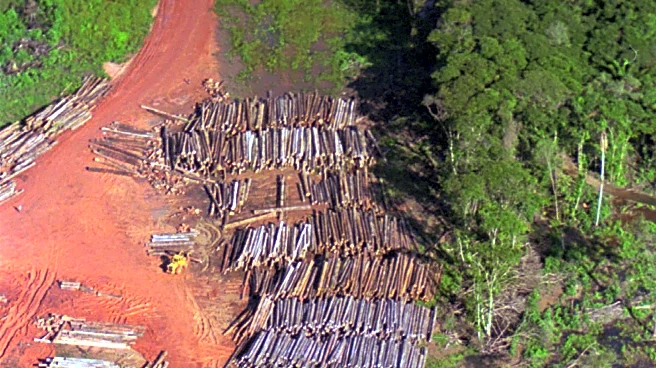BOGOTA, Colombia (AP) — Suriname’s government has pledged to permanently protect 90% of its tropical forests, a move conservationists say is among the most ambitious commitments to climate and biodiversity
ever made by an Amazonian nation.
The announcement came during Climate Week in New York City. Foreign Minister Melvin W.J. Bouva delivered the pledge on behalf of President Jennifer Geerlings-Simons, who took office two months ago.
Suriname already has the world’s highest share of forest cover, with about 93% of its land blanketed in tropical rainforest. Most of that remains primary forest untouched by logging, agriculture or mining. Scientists say Suriname is one of only three countries worldwide that absorbs more carbon dioxide than it emits — a so-called “carbon sink” — making its forests a critical buffer against global warming.
“We understand and accept the immense responsibility of stewarding over 15 million hectares of tropical rainforest in a world that is seeing her forests fall day in and day out,” Geerlings-Simons said in remarks released by her office.
The pledge far surpasses the “30x30” global target — a U.N.-backed goal for countries to protect 30% of land and oceans by 2030. It comes weeks before COP30, the U.N. climate summit that will be hosted in Belem, Brazil, at the heart of the Amazon rainforest.
Suriname’s government says it will update conservation laws by the end of the year to create stronger protections for its forests. The new framework could also recognize the ancestral lands of Indigenous and Maroon peoples — descendants of enslaved Africans who escaped into the rainforest — and aims to expand opportunities in ecotourism and the growing carbon credit market.
A coalition of environmental donors has committed $20 million to help finance the effort and support local jobs tied to forest protection.
Conservationists hailed the move as unprecedented for the Amazon, where deforestation has risen again this year despite international pledges to reverse forest loss.
“This sets a new standard for the Amazonian region as a whole, which has suffered from serious deforestation in recent decades,” said Russell Mittermeier, chief conservation officer at Re:wild, a global conservation nonprofit.
Suriname’s rainforests harbor jaguars, giant river otters, tapirs and more than 700 bird species, as well as the striking blue poison dart frog. Advocates say keeping such ecosystems intact is vital not only for local communities but also for stabilizing the global climate.
Hugo Jabini, a lawyer from Suriname’s Saamaka Maroon community and a 2009 Goldman Environmental Prize winner, said the pledge will mean little unless the government addresses long-standing Indigenous and tribal land rights.
“Suriname is the only country in the Western Hemisphere where Indigenous and tribal land rights are not legally recognized,” he told The Associated Press. “Without recognition, the very people who depend on the forest — and who are best placed to protect it — cannot truly safeguard it.”
He warned that illegal mining, logging and roadbuilding already threaten communities despite international court rulings ordering Suriname to halt concessions. Protecting 90% of the forest, he added, will require international support to create sustainable alternatives to extraction.
Sirito Yana Aloema, president of the Organization of Indigenous Peoples in Suriname, also cautioned that the pledge will be meaningless without enforcement. But Aloema warned that weak infrastructure, corruption and the lure of illegal mining undermine efforts.
He said Indigenous communities want to be recognized as legal guardians of the forest.
“To protect our forests, we need to be in the forest,” he said. “The best people to do this are the Indigenous people and the Maroon people.”
___
The Associated Press’ climate and environmental coverage receives financial support from multiple private foundations. AP is solely responsible for all content. Find AP’s standards for working with philanthropies, a list of supporters and funded coverage areas at AP.org.










